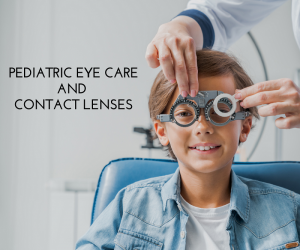 With so much going on in your children’s lives, it can be difficult to keep up. However, it’s important to make sure they can see the world in front of them as clearly as possible.
With so much going on in your children’s lives, it can be difficult to keep up. However, it’s important to make sure they can see the world in front of them as clearly as possible.
Did you know that children should have their first eye exam around the age of six months? If the first exam shows their eyes are healthy, you won’t need to follow up with another appointment until the ages of 2 and 3 years.
Although many schools offer annual screenings, they are not complete visual exams and the results can be inaccurate. If you notice your child is having trouble with their vision, it is important to seek a comprehensive eye exam so your optometrist can identify the issue and treat it accordingly. As with most conditions, early detection can make treatment much easier than it would be if you waited to see the doctor and allowed the problem to develop into something worse.
How do I know if my child is experiencing vision problems?
We encourage you to pay close attention if your child experiences any of these five symptoms as they can be related to vision problems for children:
1. Rubbing of the eyes
2. Excessive blinking
3. Frequent squinting
4. Regular headaches
5. Shutting one eye to focus
Even if eye problems do not run in the family and your child hasn’t displayed any of the symptoms above, he or she should visit the optometrist every year after the age of 3 to ensure the eyes are in good health. We can address any questions you have regarding your child’s first visit to the eye doctor before the appointment so he or she will know exactly what to expect. We will do everything we can to ensure that your child has a comfortable, enjoyable visit to our office.
Can my child use contacts instead of wearing glasses?
There are a number of reasons why children might not be crazy about wearing glasses. Whether they participate in contact sports, don’t like the appearance of glasses, or don’t like the way glasses feel, you may find that your child is interested in alternative options for prescription eyewear.
While we typically encourage children under the age of 12 or 13 to wear glasses as opposed to contact lenses, as there is a great deal of responsibility that comes with wearing and caring for contact lenses. However, contact lenses can be a safe and effective option for those children with the maturity to take extra care with contact lens handling, storage, and cleaning. If your child is interested in contact lenses, we will schedule a consultation and lens fitting exam to explain the responsibilities and ensure that this is the best option of treatment.
How will I know which type of lens is best for my child?
There are so many types of contacts that the decision can be quite confusing if you are trying to do it alone. During your exam, we will help you decide which types of contacts would be best for your child depending on his or her specific needs, prescription, and level of responsibility. Here are some of the most common contact lenses that we may recommend:
Disposable-wear lenses – These lenses are made to be thrown away after you wear them for a certain period of time. There are some made to be replaced daily, while others are made to last up to two weeks, if not longer. Wearing disposable lenses is better for the overall health and comfort for your eyes. There are substances in your tears (like protein, calcium, and more) that build up on your lenses, which can get quite uncomfortable. These lenses are a safer option for children as they are less likely to cause an infection due to their limited period of use.
Extended-wear lenses – These are disposable lenses that can be worn for a longer period of time. You can even wear them when you sleep! They can last up to two weeks or even longer depending how often you wear them.
Daily-wear lenses – These are disposable lenses made to be changed daily. They can be quite convenient since you won’t have to worry about cleaning them. They are good to wear when you play sports since they are affordable enough to throw away after a game.
If your child is unable or reluctant to wear glasses, there are many options we can explore to best help your child experience comfortable and clear vision. If you have not already scheduled your child’s annual comprehensive eye exam, contact Horizon Family Eye Care today.

